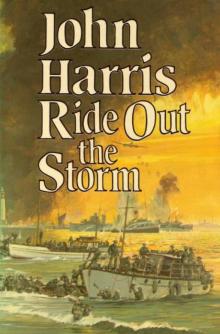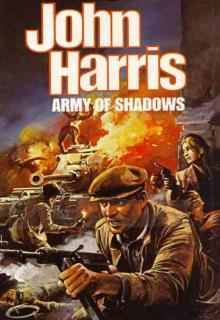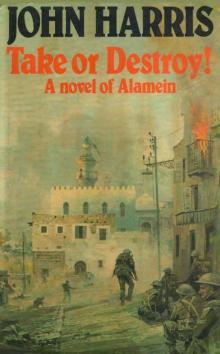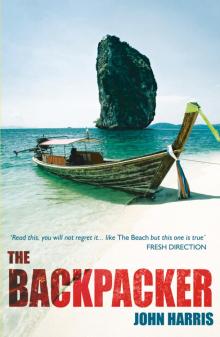- Home
- John Harris
China Seas
China Seas Read online
Copyright & Information
China Seas
First published in 1979
Copyright: Juliet Harris; House of Stratus 1979-2011
All rights reserved. No part of this publication may be reproduced, stored in a retrieval system, or transmitted, in any form, or by any means (electronic, mechanical, photocopying, recording, or otherwise), without the prior permission of the publisher. Any person who does any unauthorised act in relation to this publication may be liable to criminal prosecution and civil claims for damages.
The right of John Harris to be identified as the author of this work has been asserted.
This edition published in 2011 by House of Stratus, an imprint of
Stratus Books Ltd., Lisandra House, Fore Street, Looe,
Cornwall, PL13 1AD, UK.
Typeset by House of Stratus.
A catalogue record for this book is available from the British Library and the Library of Congress.
EAN ISBN Edition
0755102401 9780755102402 Print
0755125797 9780755125791 Pdf
0755125819 9780755125814 Mobi/Kindle
0755125835 9780755125838 Epub
This is a fictional work and all characters are drawn from the author’s imagination.
Any resemblance or similarities to persons either living or dead are entirely coincidental.
www.houseofstratus.com
About the Author
John Harris, wrote under his own name and also the pen names of Mark Hebden and Max Hennessy.
He was born in 1916 and educated at Rotherham Grammar School before becoming a journalist on the staff of the local paper. A short period freelancing preceded World War II, during which he served as a corporal attached to the South African Air Force. Moving to the Sheffield Telegraph after the war, he also became known as an accomplished writer and cartoonist. Other ‘part time’ careers followed.
He started writing novels in 1951 and in 1953 had considerable success when his best-selling The Sea Shall Not Have Them was filmed. He went on to write many more war and modern adventure novels under his own name, and also some authoritative non-fiction, such as Dunkirk. Using the name Max Hennessy, he wrote some very accomplished historical fiction and as Mark Hebden, the ‘Chief Inspector’ Pel novels which feature a quirky Burgundian policeman.
Harris was a sailor, an airman, a journalist, a travel courier, a cartoonist and a history teacher, who also managed to squeeze in over eighty books. A master of war and crime fiction, his enduring novels are versatile and entertaining.
Map
Part One
1900–1903
One
The siege was an ordeal that went on and on. There was no respite, and all the time in their ears were the high screeching yells of the fanatical Chinese. From time to time the screeching became frantic, so that the women closed their eyes and wept, and the tension rose in direct proportion to the number of casualties. Three weeks had passed by this time and there was no sign of relief. Had they been deserted? It was a thought none of them liked to entertain for long, and occasionally there were flashes of bitterness and temper, and then the huge, enormously thick walls surrounding them seemed larger, closer, more brooding, only the pink and yellow tiles of the buildings beyond indicating there was a world outside.
Willie Sarth lit a cigarette. There were plenty of them, which was as well because everybody smoked, even the women, which in 1900 was unusual. The reason was simple: Peking was never the sweetest smelling of cities, especially in summer, and now the problem of sewage disposal inside the besieged legations had become overwhelming. To make matters worse now that the rains had finished and the hot summer drought had set in, water was short and not everybody bothered to bath, even if they could, and tobacco smoke helped to turn aside the smell.
Drawing meditatively on the cigarette, Willie shifted his position. Stone was hard to the backside and the barricade where he crouched was not very spacious, so there was little room to stretch and he was a tall, well-built young man, dark-haired as any Chinese and handsome in a way that didn’t seem quite English.
History he thought was being written in blood and suffering behind the Tartar Wall. It crossed his mind that that sentence was worthy of a better place than in the brain of an ordinary young man of nineteen with few prospects to begin with and, now, with the Boxer Rebellion, none at all beyond a very uncomfortable death. It should, he thought, have been written by a novelist or a newspaperman so that it could be read by others. He’d try to remember it, he decided, so it could be repeated later. He paused frowning. If there was a later, he thought.
He was sitting behind the sandbag barricade with other members of what was contemptuously called by the military the Carving Knife Brigade. They were mostly civilians or ex-soldiers who liked to tie knives to their rifles to make them equal with the regular soldiers who had bayonets, and they were not popular, because for the most part they were not skilled and half of them didn’t know how to shoot. A few of them were missionaries, in fact, whose idea about refusing to do violence to others had rapidly withered under the changing circumstances. For a long time they had felt that the love they preached with the Gospel would deal with all their enemies, but, after a few hundred of them had been massacred, their views had taken a radical turn for the worse. And not surprisingly, either, Willie thought. Twice blest was he whose cause was just. Thrice blest was he who got his blow in fust. It didn’t pay to stop and argue with a maddened Chinese peasant decked out in red Boxer ribbons who was advancing on you with a huge two-handed sword, honed to the sharpness of a razor. Willie had seen the damage they could do and preferred to shoot first and ask questions afterwards.
All the same –
He paused. The Chinese had a point when you thought about it, he had to concede. The European nations who had demanded – and received – trading rights in China had begun to carve up the country as they had carved up Africa years before and the Chinese had finally come alive to the fact.
He wiped the perspiration from his face with his sleeve. A lowering grey sky pressed down, the air still heavy from the recent rains, the oppressive summer heat adding to the sense of doom. It was in Peking, the capital city of China, situated in the northern provinces of that vast land, where the trouble had come to a head and the long-festering uprising had localised, bringing death to the yang kuei-tzu, the white-skinned, pale-eyed foreign devils the Chinese hated so much, the ‘barbarians from outside’ as they were scornfully called.
Willie had another go at his face with his sleeve, wiped his hands, which were slippery with sweat, on the butt of his ancient rifle, and peered ahead of him along the Tartar Wall. Hours sometimes passed without anyone actually seeing the enemy. Their presence was always known, however, because of the almost continuous stream of rifle fire, though no patrols were ever sent out to check where it came from, because the enemy occupied all the territory beyond the immediate walls. Fortunately, in China, city walls were built to last and, sitting behind the barricade of sandbags, Willie Sarth thanked God for it. The Tartar Wall where the barricade was situated – one of several designed to stop an attack – was wide enough for four carriages to be driven abreast along it at full speed, so there was little chance of the Chinese knocking holes in it, especially since they had few guns and none of them of any size; though, even at that, they were bigger and more numerous than anything the defenders possessed. The only real weapon the defenders could fire was a nine-pounder they had made themselves from the wheel-less barrel of a relic of the Anglo-French expedition of forty years before. And even that was inaccurate at any distance and was usually loaded only with old nails, scrap iron and nuts and bolts.
At the end of the Tartar Wall, where you could see into the Chinese City,
there was a patrol of Russians, under a naval ensign from the Russian Legation called Zychov. He was a count or a baron or something, a tall handsome young man who spoke French, English and a little Chinese and wore a curling moustache which he was believed to wear in a bandage every night to enable it to keep its shape.
‘If we’ve got to die,’ he had once pointed out with a great show of gallantry, ‘we might as well die looking our best.’
‘It doesn’t seem to matter how we look if we end up dead,’ Willie had replied and Zychov had laughed.
‘That’s the difference between the way we’ve been brought up,’ he said. ‘No aristocrat would think of facing death looking as if he’d just been dragged out from under a hedge. Why do you think the French nobles wore wigs and powder to the guillotine?’
Willie shifted again, wondering what he was doing there. Certainly his older brother, Arthur, his legal guardian since the death of his parents in a pleasure boat accident on the Thames seven years before, had not agreed with his wish to head east in search of his fortune.
‘You’re barmy,’ his brother had announced, and, sitting on the Tartar Wall in the besieged city of Peking, Willie decided he had been dead right.
But work as a clerk in the dark offices of Wainwright and Halliday’s, exporters and importers, in the city of London, had long since grown dull when Ortho Bohenna had walked into the office. Bohenna, a Cornishman, who had gone to sea thirty years before as a deckhand, had jumped ship in China, and, setting up an office in Canton, within ten years was trading in tea, silk, cotton cloth, wool, metal, pepper, spices – and opium. Though people didn’t speak out loud about it, every day in the City knew that the British held a virtual monopoly on the opium trade. And when the tax on tea had been lowered in 1890, it had required only a little astuteness to realise that the consumption of that beverage in Britain would increase a hundredfold. Bohenna had been quick to spot the change and, falling in with a schooner skipper whom he had persuaded to import Indian opium and export China tea, in no time at all he had made them both wealthy. The schooner skipper had eventually been lost at sea in one of the squalls which blew off the South China coast, and Willie had once heard George Wainwright, who ran Wainwright and Halliday’s, say that he thought Bohenna had pushed him overboard to get his hands on his ship and avoid having to share the profits.
Certainly Bohenna’s appearance and manner indicated that it might be possible. He was a big man, with a hard face brown as saddle leather that looked as if it had been hewn out of a tree. His manner was breezy and he waved aside all objections, so that George Wainwright and Arthur Halliday, neither of them prepossessing figures despite being a power in the import trade, gave way again and again to him and he practically dictated his own terms.
By 1898, however, he was an old man and talking of retiring, though he still couldn’t bear to let the profits that were to be made in the East slip through his fingers.
‘They say the boom’s over,’ he had said, sitting opposite Willie, his feet on Willie’s desk as he waited for Wainwright and Halliday to finish dealing with the customer they had in their room. ‘But don’t you believe it, son. It’s hardly started. There’s a lot to be made around the China seas. It’s not just the money either. You can do what you like out there. There’s everything a youngster wants. Life. Adventure. Cheap booze. Sing-song girls.’
Willie hadn’t been sure what sing-song girls were, but he had a shrewd suspicion that they didn’t just sing songs and, as a seventeen-year-old virgin beginning to feel the restrictions of the late Victorian age, he itched to see something of this paradise Bohenna described.
‘How do you go about it?’ he had asked.
‘Well,’ Bohenna had said, waving his cigar, ‘for one thing, you don’t sit behind that desk there asking how to go about it. You get up and make your way to China.’
‘How?’
‘Sign on as a deckhand, and jump ship when you get there. That’s what I did.’
So Willie did, too. It had taken some doing to screw up his courage. Five years of eight-to-six working, bread and dripping breakfasts at his brother’s house in Balham, bread and cheese lunches, and sausage and potatoes for tea – with not much variation, except at weekends when there might be a rabbit, or at Christmas, when his brother Arthur’s wife produced a goose – had left their mark. Life had consisted of work, church on Sunday and the Young Men’s Christian Endeavour, or playing the piano for a social evening with a cup of tea and a bun during the week. Only once in his life had Willie broken away from it – when Bohenna had produced a bottle of grog and managed to get him half-drunk.
Brushing aside Wainwright’s indignant protests, he had called a hansom to take Willie home, but it hadn’t done him a lot of good in the office and somehow he had a feeling that his fall from grace would prevent him in the long run from ever reaching that cherished job of chief clerk, who, because of his eminent position, enjoyed a small office to himself. After Bohenna’s final encouragement, however, it hadn’t mattered much.
The argument at his brother’s home had gone on for days. Arthur Sarth had not wished to see the money Willie contributed to the household finances disappear, but Willie had been adamant. He had looked up a ship, learned that there was a job going as a deck boy, and signed on.
Having taken the step, he had gone down to Brixton, where Edie Wise, with whom he was solemnly walking out in the evenings, lived with her parents, and made his announcement. She fell into his arms in floods of tears and swore she’d die without him.
‘You can’t! You can’t!’ she said.
‘I’ve got to. I’ve already signed the ship’s articles. Name of Lizzie Hart. Four-master. Mixed cargo.’ He spoke with a certain amount of pride, feeling a terrible dog.
‘It won’t be that long,’ he had pointed out. ‘I’ll be back in eighteen months. It’s easy to make money out there.’
The idea of being married to money dried Edie’s tears and she began to eye Willie with new interest. ‘Will you be rich?’ she asked.
‘You should see some of ’em,’ he said. ‘They come into the office, smoking cigars and wearing hand-made shoes and shirts and all that. Rings on their fingers. Pearl tie pins. And their wives! You should see them.’
Somewhat mollified, she swore she’d wait for him, and their parting that evening was passionate enough for her to allow him, as they clung together in the front room of her parents’ home in the semi-darkness, to unfasten the front of her blouse and place his hand on her breast. Willie felt a proper roué.
The following day he went to the docks, carrying a small brown paper parcel containing his belongings, and readied himself for his meeting with China. Unfortunately he had not examined the ship’s articles very carefully and the Lizzie went to India.
It hadn’t even been a very pleasant trip. They had run into a lot of bad weather, the first mate was a hard taskmaster and, being Johnny Newcome, Willie was treated as a skivvy by everybody else in the crew. It didn’t take him long, however, to learn the art of withstanding bullies. He had offered to take on the first of them then and there on the deck and sensing that in addition to dealing out punishment he might also receive a little, his tormentor had backed off with a lot of loud threats that came to nothing. After that Willie was left alone.
Considering he was half-way to his destination, when the ship had left Bombay, Willie had not reported aboard and had watched her sail for home. After a week of starving and sleeping in the hut of a soft-hearted dock foreman, he had learned of a steam freighter going to Shanghai and found himself aboard. She was a profit-making, ill-designed, meanly-found vessel as obsolete as the gallows, but the galley boy had sliced open his hand and been rushed to hospital apparently bleeding to death, and Willie had found himself doing the job instead, living among the cockroaches in the glory hole and wistfully watching the deck crew as they went about their business, walking wide-legged on the deck, always a freer, more self-confident lot than the stewards. Especially when th
e chief cook went round the bend and started going for everybody with a knife. It was a good thing for Willie that the engineer finally clubbed him with a spanner as long as his arm as the ship staggered across the South China Sea with the wind on the beam and lockers bursting open and exploding their contents everywhere. Ending up as cook, Willie was quick to leave the ship in Shanghai.
The cargo, largely Indian cotton, had been put ashore, but there had been a great deal of quiet talk on the quayside between the ship’s captain and the owner of a dry-goods warehouse ashore. Willie knew what was going on and, keeping his ears open, had heard the word ‘opium’. When the ship returned to India, he had looked up Wainwright and Halliday’s agent, and had learned that the ship was shortly due to return to the mouth of the Peiho River. A quiet discussion with one of the clerks, a yellow-faced young Yorkshireman called Hackett, had ended with him being trusted with a small package which he was told to hand over to a man called Howell whom he would meet in Tientsin.
Willie knew exactly what was in the packet and he was terrified. When he went ashore at Tientsin the package was in his shirt. Howell wasn’t hard to find and he had handed over the money without argument.
‘When are you coming again?’ he asked.
Willie had hedged and said he wasn’t sure and Howell said he’d always be glad to see him. ‘Indian opium’s better than Chinese,’ he had said. ‘Fetches a better price.’
When Howell had disappeared, Willie found a teahouse and sat for a long time staring into space. He had a feeling he was on to a good thing and even on the point of ending up with a lot of brass. More by luck than judgement, he had already made contact with the two ends of the opium trade and, as he well knew, it was opium that made money. Nevertheless, the thought disturbed him. He had been decently brought up, first by his parents and then by his elder brother, and, taught right from wrong, he knew that selling opium was reprehensible. His brother was an elder of his chapel who sometimes preached from the pulpit and he had once delivered a lecture on the evils of the trade, painting horrifying pictures of stupefied Chinese lying in stinking bunks in dens filled with scented smoke. Where he had got the information Willie couldn’t imagine, because Willie’s brother was a clerk like himself and certainly not a man who had seen the seamy side of life.

 China Seas
China Seas The Mercenaries
The Mercenaries Road To The Coast
Road To The Coast The Thirty Days War
The Thirty Days War The Old Trade of Killing
The Old Trade of Killing Ride Out The Storm
Ride Out The Storm Corporal Cotton's Little War
Corporal Cotton's Little War Fox from His Lair
Fox from His Lair Paint The Rainbow
Paint The Rainbow Flawed Banner
Flawed Banner Covenant with Death
Covenant with Death So Far From God
So Far From God The Sea Shall Not Have Them
The Sea Shall Not Have Them The Cross of Lazzaro
The Cross of Lazzaro Smiling Willie and the Tiger
Smiling Willie and the Tiger Harkaway's Sixth Column
Harkaway's Sixth Column The Sleeping Mountain
The Sleeping Mountain The Claws of Mercy
The Claws of Mercy North Strike
North Strike Picture of Defeat
Picture of Defeat Army of Shadows
Army of Shadows Right of Reply
Right of Reply Getaway
Getaway The Lonely Voyage
The Lonely Voyage Take or Destroy!
Take or Destroy! The Backpacker
The Backpacker A Funny Place to Hold a War
A Funny Place to Hold a War Swordpoint (2011)
Swordpoint (2011) A Kind of Courage
A Kind of Courage